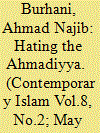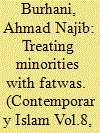|
|
|
Sort Order |
|
|
|
Items / Page
|
|
|
|
|
|
|
| Srl | Item |
| 1 |
ID:
131481


|
|
|
|
|
| Publication |
2014.
|
| Summary/Abstract |
Religious diversity and pluralism is commonly understood within the context of the relation between various religious traditions, not within a single religious tradition. This limitation of the boundary of religious pluralism could overlook the fact that conflict within a single tradition can be bitterer and more disastrous than conflict with other religions. In the last decade, for instance, the Ahmadis in Indonesia have become victims of constant attacks. This article, therefore, intends to study the place of the Ahmadiyya in the context of religious pluralism in Indonesia by answering the following questions: Why was the treatment of the Ahmadis in recent years by Muslims more vitriolic than their treatment of non-Muslims? What is the nature and quality of life for people who have been excluded from a 'normal' religious identity in a time when religious attachment is a necessary fact for that society? Why did the attacks on the Ahmadiyya occur in the present regime, not during the past authoritarian one? This article argues that the charge of heresy issued by Muslim institutions put the Ahmadiyya in liminal status; they are in the zone of indistinction between Muslims and non-Muslims. This makes them vulnerable to persecution since they have been deprived of their rights as Muslims, while their rights as non-Muslims are still suspended. Non-Muslims, particularly ahl al-kit?b (People of the Book), have been accepted theologically in Muslim society, but there is no place of tolerance for heretics. The rise of intolerance in Indonesia parallels the rise of religious conservatism after the fall of Suharto in 1998.
|
|
|
|
|
|
|
|
|
|
|
|
|
|
|
|
| 2 |
ID:
134223


|
|
|
|
|
| Publication |
2014.
|
| Summary/Abstract |
The term "minority religious community" in the Muslim country of Indonesia refers not only to those embracing religions other than Islam, but also to minority groups like the Ahmadiyya. Recently, the treatment of Ahmadis has been worse than the treatment of non-Muslims. This article, therefore, intends to study the status of 'deviant' groups under Islamic law and the treatment of them in Muslim society. Specifically, this article addresses the following questions: How did ulama in the past define and treat minority groups? How do contemporary Sunni ulama define and treat the Ahmadiyya? What is the status of this group under Islamic law? Are they apostates, heretics, or unbelievers? And what are the legal consequences of these charges? To answer these questions, this article employs two methods. First, for theoretical treatment of minority groups in the past, this article focuses its analysis on al-Ghaz?li's Fay?al al-tafriqa and Fa??'i? al-b??iniyya. Second, following a discussion of classical Islam, the article moves to contemporary time by analyzing fatwas against the Ahmadiyya from five institutions: the R?bi?a al-'?lam al-Isl?m?, Majelis Ulama Indonesia (MUI), Muhammadiyah, Council of the Islamic Fiqh Academy of the Organization of Islamic Cooperation (OIC), and Nahdlatul Ulama (NU). This article argues that, first, fatwas against the Ahmadiyya issued by these institutions were intended as a device to sustain orthodoxy of umma and, second, orthopraxy or devoutness in observing religious rituals, as practiced by the Ahmadis, does not exempt them from the charge of apostasy because theologically they are believed to deviate from orthodox beliefs.
|
|
|
|
|
|
|
|
|
|
|
|
|
|
|
|
|
|
|
|
|